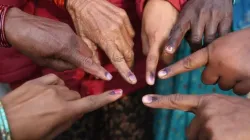'One Nation, One Election' to be implemented in current tenure of NDA govt: Reports
The BJP-led NDA government is set to push for the 'one nation, one election' reform during its current term, with sources expressing confidence that the proposal will receive cross-party support.

The BJP-led National Democratic Alliance (NDA) government, under the leadership of Prime Minister Narendra Modi, is gearing up to implement the 'One Nation, One Election' reform within its ongoing tenure, sources on Sunday (September 15) revealed. This significant policy shift is aimed at synchronising national and state elections across India, a move that has earlier sparked widespread political debate.
As the Modi government marks 100 days of its third term in office, the sources as quoted by the news agency PTI expressed confidence in the reform, stating that the proposal would garner support from multiple political parties. "It will definitely be implemented in this tenure. It will become a reality," one source said, speaking on condition of anonymity.
High-level Committee submits its report in March
The recent development comes months after the high-level committee on simultaneous elections submitted its extensive 18,626-page report to President Droupadi Murmu. Notably, this committee, led by former President Ram Nath Kovind, held comprehensive consultations to gather perspectives from various stakeholders across the political and social spectrum.
According to the report, over 47 political parties shared their views, with 32 supporting the concept of simultaneous elections. In addition, a public notice published in newspapers garnered 21,558 responses from citizens, 80% of whom were in favor of the proposal.
Legal experts, including four former Chief Justices of India, twelve former Chief Justices from major High Courts, and four former Chief Election Commissioners, were also invited to offer their insights. The Election Commission of India’s views were also considered in the discussions. Furthermore, apex business organizations like the Confederation of Indian Industry (CII), Federation of Indian Chambers of Commerce & Industry (FICCI), and the Associated Chambers of Commerce and Industry of India (ASSOCHAM), along with prominent economists, were consulted to examine the economic impacts of asynchronous elections. These bodies emphasized that staggered elections can lead to inflationary pressures, slow economic growth, and disrupt public expenditure and social harmony.
'Committee proposes two-step approach'
After reviewing the input from these consultations, the Committee proposed a two-step approach to implement simultaneous elections. In the first phase, elections for the House of the People (Lok Sabha) and the State Legislative Assemblies would be synchronized. In the second phase, Municipalities and Panchayat elections would be aligned with the House of the People and State Legislative Assemblies within a 100-day timeframe.
The report also recommended the use of a unified electoral roll and a single Electoral Photo Identity Card (EPIC) for elections across all three tiers of government—national, state, and local.
(With inputs from PTI)